Unseen Crises: Why You Should Care About What's Happening in the Congo and Sudan
Current Events
|
Nov 16, 2023
|
6 MIN READ
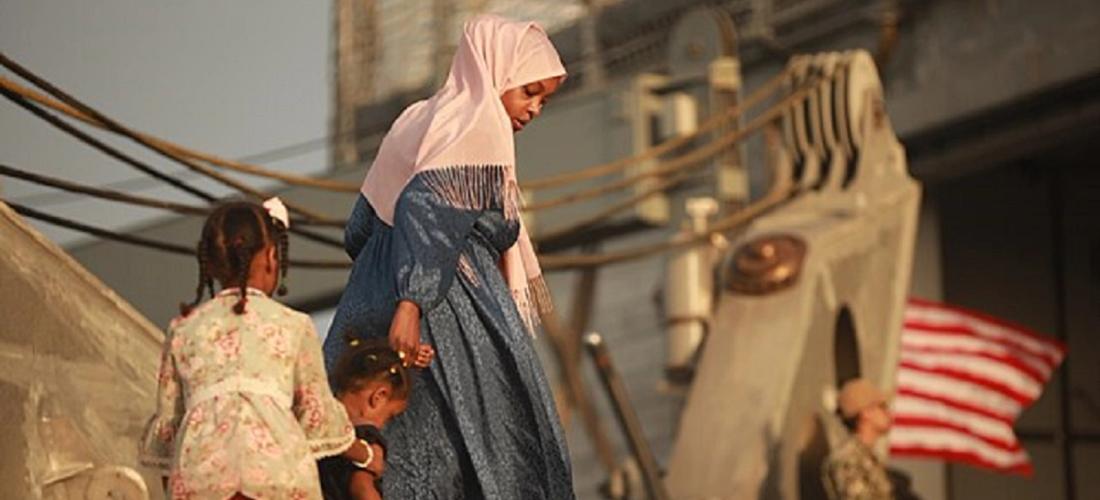
A woman tries to board a U.S. military ship to escape out of the genocide and conflict in Sudan; image source: Wikimedia Commons
While the world's attention often turns to the most publicized international events, ongoing crises in other regions remain primarily unseen, simmering beneath the global radar. But they also require our attention, too.
The Democratic Republic of the Congo (DRC) and Sudan are prime examples, beset by complexities that demand international attention and understanding. These regions, rich in culture and history, face struggles deeply interconnected with global economic and political dynamics. From the extraction of minerals essential for our electronics in the DRC to the political instability in Sudan affecting global security, the challenges they face are not isolated; they have rippling effects on the international stage.
We all must understand why we should care about these distant lands. The oppression and suffering in the Congo and Sudan are not just regional issues; they are human issues. Our brothers and sisters in Islam and our brothers and sisters in humanity are suffering. In an increasingly interconnected world, the struggles of one part can quickly become the struggles of the whole.
What happens in these countries can impact global markets, migration patterns and even international relations. By remaining informed and empathetic towards these situations, we recognize our shared humanity and the global community we are part of.
Moreover, there's a moral imperative to be aware of and understand these crises. The genocides and humanitarian crises happening in these parts of the world are not just news items; they are realities affecting millions of lives. It may feel hard to spare attention for the multiple humanitarian crises happening when our hearts are pulled towards one over the other.
But, pushing ourselves towards greater awareness about things happening in different parts of the world is the first step in a journey towards change. As global citizens, we can raise awareness, educate ourselves and influence action, whether through advocacy, support to humanitarian efforts, or simply by being informed and informing others. Our understanding and engagement can be powerful tools in helping to alleviate these crises and make a stand against oppression and suffering.
So, let’s spend some time understanding what’s happening in the DRC and Sudan, how we can educate ourselves, and how we can help.
Understanding Context Behind the Crises in Sudan & the Democratic Republic of Congo
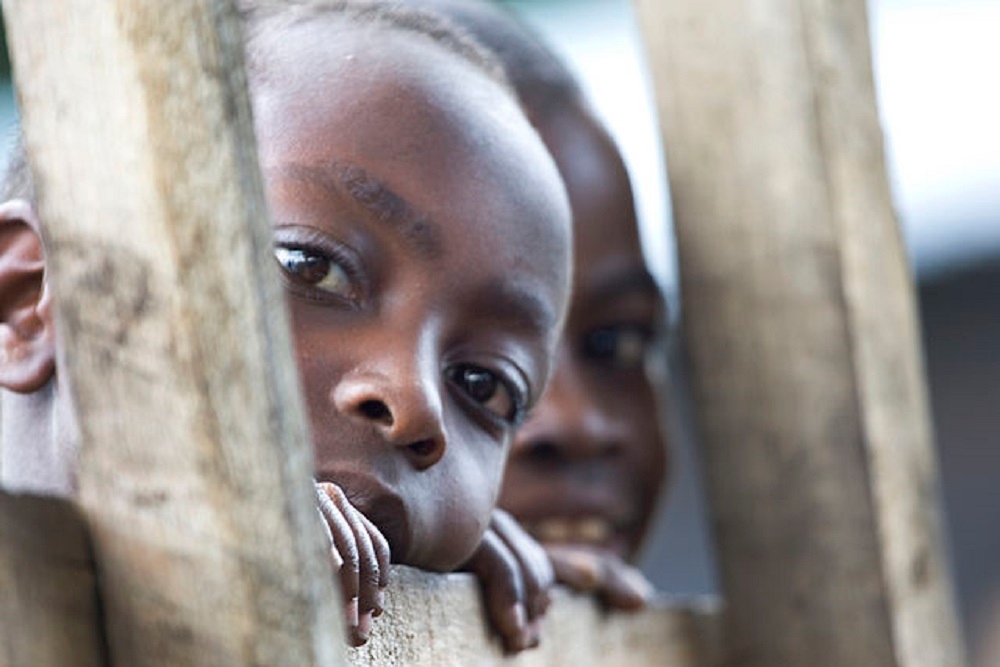
Children eavesdrop on Congo citizens sharing their stories of survival with interviewers; image source: Wikimedia Commons.
The Democratic Republic of the Congo
1. Historical context: The Democratic Republic of the Congo (DRC) is in Central Africa. It is the second-largest country in Africa by area and the 11th-largest globally. The DRC has a history of colonial exploitation, dictatorship and conflict over its vast mineral wealth. These resources, unfortunately, have fueled violence rather than development. Militia groups in the Congo often coerce local populations into labor, forcing them to work in mines under harsh and dangerous conditions.
2. Ongoing conflict: The country has been plagued by internal conflict for decades, with over 100 armed groups currently active. These conflicts are not just about power but are also deeply intertwined with ethnic tensions and control over natural resources. Since March of 2022, these conflicts have killed thousands, with deaths totaling over six million since 1996.
Just reflect upon these numbers for a minute.
3. Humanitarian crisis: The humanitarian situation is dire. As of 2023, more than five million people are displaced within the country, and there's a profound need for necessities like food, clean water and medical care.
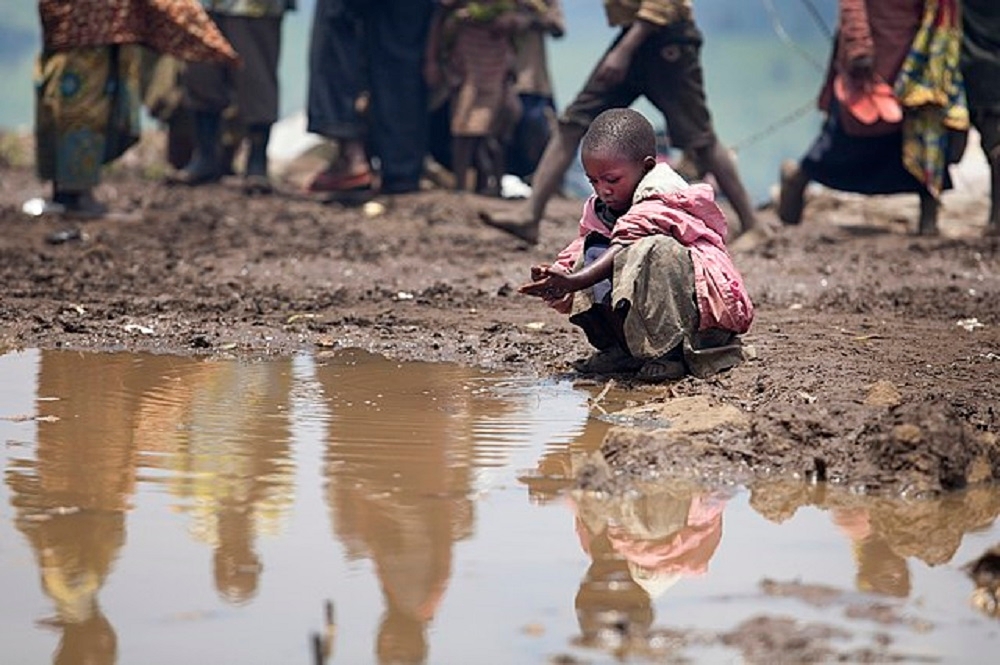
A small girl washes her hands in a puddle near Monusco base in Kitshanga (in the Congo) after heavy fighting; image source: Wikimedia Commons.
Sudan
1. Political turmoil: Sudan is geographically located in Northeast Africa. Its location has historically made the country a crossroads of diverse cultures and influences. Sudan has been grappling with political instability, especially after the overthrow of Omar al-Bashir in 2019. Clashes between the Sudan Armed Forces (SAF) and the paramilitary Rapid Support Forces (RSF) have devolved into a civil war.
2. Conflict zones: Regions like Darfur, South Kordofan and the Blue Nile have been conflict hotspots, with civilians bearing the brunt of violence and human rights abuses.
3. Humanitarian need: Millions in Sudan require humanitarian assistance and are grappling with displacement, food insecurity and lack of basic services. The alarm bells are ringing loud by humanitarian organizations, warning of an impending genocide.
Why Should You Care?
Global Impact
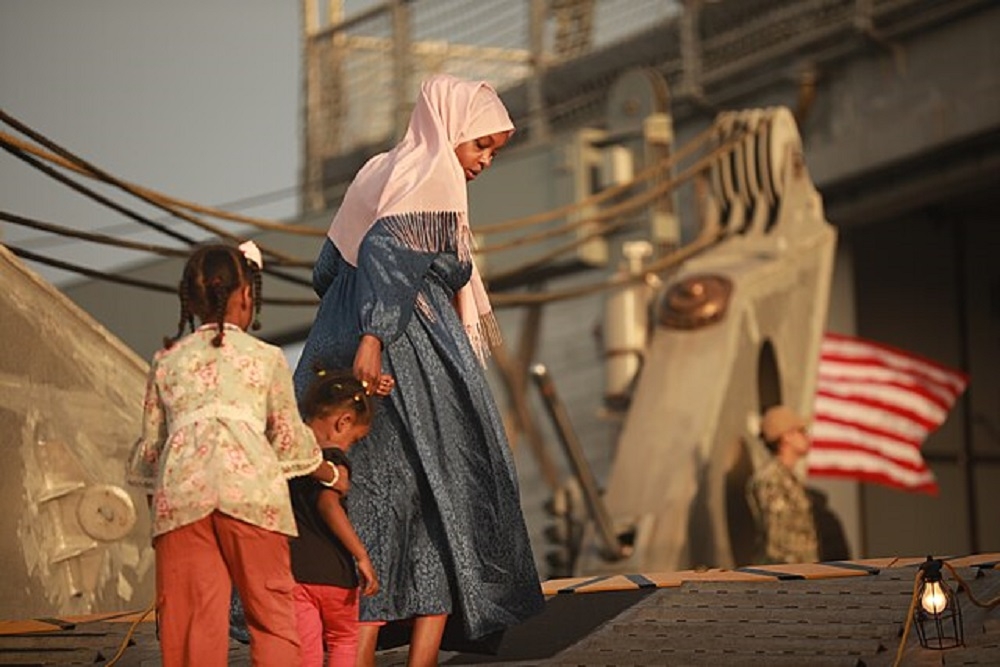
U.S. citizens and others who have requested departure from Sudan board the Military Sealift Command expeditionary fast transport ship USNS Brunswick (T-EPF 6) while it moors in Port Sudan amidst the bloody conflict; image source: Wikimedia commons.
1. Refugee crisis: The conflicts in both countries contribute significantly to the global refugee crisis. Understanding and addressing these issues can help alleviate this growing problem.
2. Security concerns: Instability in these regions can have wider security implications, potentially affecting neighboring countries and, by extension, global security.
3. Moral responsibility: Acknowledging and responding to human suffering, regardless of where it occurs, is a moral imperative for global citizens. In a world where boundaries are increasingly blurred by technology and shared global challenges, our moral compass must extend beyond our immediate surroundings. The plea for empathy and action is not confined to any one group; it encompasses everyone, irrespective of religion, race or nationality.
Call to Action/How We All Can Help
Social Media
Follow these accounts on Instagram to keep up with what is happening in the DRC and Sudan. This is a good way to start the process of educating yourself.
Educate Yourself
Read more about the history and current situation in these countries. Knowledge is the first step towards meaningful action. Consider these books:
- "Dancing in the Glory of Monsters" by Jason Stearns for an in-depth look at the Congo
- "The Sudan Handbook," edited by John Ryle, for insights into Sudan's complex history
Support Relief Efforts
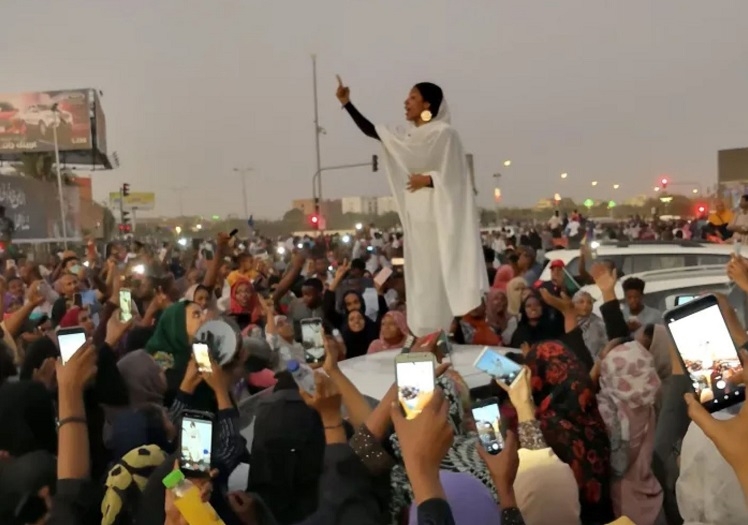
A Muslim woman stands above the crowd to protest in Sudan; image source: Twitter.
Donate to organizations working on the ground:
For the Congo:
- Doctors Without Borders: Providing medical aid in conflict zones.
- International Rescue Committee: Assisting with healthcare, education, and economic recovery.
For Sudan:
- Save the Children: Offering aid and protection to children in Sudan.
- Sudan Relief Fund: Focused on providing food, clothing, shelter and medical care.
Advocate and Raise Awareness
Use your voice on social media and within your community to raise awareness about these issues. Contact political representatives to advocate for these regions' foreign aid and diplomatic efforts. Visit the websites of the United States House of Representatives and Senate to find your representative and senator.
When contacting your U.S. representative or senator about the situations in the Democratic Republic of Congo (DRC) and Sudan, your communication must be informed and specific. Here are some key questions and points you might consider including in your conversation or correspondence:
- Humanitarian aid: "What measures are being taken or proposed by the U.S. government to provide humanitarian aid to the people in the DRC and Sudan? How can we ensure this aid is effectively and safely distributed?"
- Diplomatic efforts: "How is the U.S. engaging diplomatically to address the political and social instability in these regions? Are there any plans to foster peace and stability with international partners or organizations?"
- Call to action: Express your concern and urge your representative or senator to take specific actions or support policies or legislation addressing these crises.
Remember to be respectful and concise in your communication. Expressing your concerns clearly and politely increases the likelihood of your message being heard and taken seriously.
The situations in the Congo and Sudan are complex and heart-wrenching, but they are not hopeless. Through education, advocacy and support, we can contribute to meaningful change. We can raise crucial awareness. It’s sometimes difficult to expand our hearts and minds beyond the suffering of one of our communities. Still, I know we have the generous capacity to advocate for multiple communities suffering worldwide.
Let us not turn away from these unseen crises; instead, join hands to make a difference where it is desperately needed.
Subscribe to be the first to know about new product releases, styling ideas and more.
What products are you interested in?


